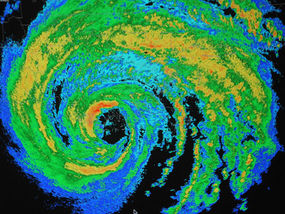 So Gustav has effectively gone. The hurricane that struck the U.S on Monday was less fierce than expected and largely spared New Orleans and Louisiana, although the cost of cleanup could still be $10 billion.
So Gustav has effectively gone. The hurricane that struck the U.S on Monday was less fierce than expected and largely spared New Orleans and Louisiana, although the cost of cleanup could still be $10 billion.
But there may not be much respite for some areas. There are currently four tropical storms swirling around the Atlantic. Leading the way is Tropical Storm Hannah, which is growing stronger and is forecast to hit the East Coast of the US tomorrow, from anywhere from Florida to South Carolina.
Behind that is Tropical Storm Ike which is heading towards the Bahamas. Finally comes Tropical Storm Josephine, which is still far out in the Atlantic. Such a flurry of Atlantic storms at the same time of year is seen as highly unusual and indicates an active hurricane season.
This high number of hurricanes is in line with new research that further adds weight to the idea that hurricanes are becoming stronger and more frequent because of global warming.
A study of satellite data going back 25 years has found that tropical storms in the North Atlantic and the Indian Ocean are getting significantly stronger and therefore more likely to develop into hurricanes with wind speeds greater than 100mph.
The findings support the idea that the ocean acts like a “heat engine” driving tropical cyclones. The theory is that as more heat builds up in the oceans, the more energy there is to become converted into the strongest winds of hurricanes.
“This has been somewhat controversial but I think the evidence is fairly compelling from our study that the strongest tropical storms and cyclones are getting stronger. With all other things being equal, we believe the warmer the oceans become, the bigger the maximum intensity of the storms,” argues Professor James Elsner of Florida State University in Tallahassee.
Elsner’s team calculated that in 1981, the average wind speed of 90 per cent of hurricanes monitored globally by satellite came to 139 mph but, by 2006, that speed had increased to 157mph.
Professor Elsner’s research, published in the journal Nature is further evidence of the destructive potential of climate change. “I think there is some reason to believe that as the oceans continue to warm, it’s likely that there will be an increase in energy that could result in an increase in intensity of storms.”
If hurricanes continue to batter the US coast during the election, climate change could become a primary election issue….
